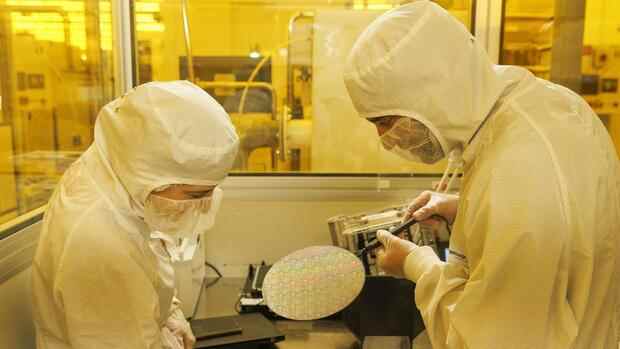Europe is unattractive for chip manufacturers.
(Photo: Bloomberg)
Europe? No thank you! A plant in Germany or the rest of Europe is currently not an issue for TSMC. This was explained by Mark Liu, the chairman of the world’s largest contract manufacturer in the chip industry, this Wednesday at the general meeting.
This is bad news, because the lines in the European industry have been standing still for almost two years. The so-called foundries such as TSMC, Samsung or UMC from the Far East do not supply nearly as many semiconductors as car manufacturers and electronics producers need.
In order to free themselves from their dependence on Asia, politicians in Berlin and Brussels have been imploring Europe to catch up with chips for months. But it already falters before it has even really started.
The granting of funding for the chip industry in Europe is dragging on like chewing gum. The US group Intel has announced that it will build new factories in Germany and Italy. However, due to a lack of funding commitments, the contracts have not yet been signed. While Asian countries pump billions into the industry, the EU and its member states slow themselves down with bureaucracy and their lengthy processes. The cancellation of TSMC is the best proof of the failure of politics in Europe.
Top jobs of the day
Find the best jobs now and
be notified by email.
Funding in the billions for large foreign corporations is not the only option: hopeful start-ups could be funded with much smaller amounts. Contrary to all big promises, however, these are also kept for months.
TSMC and Samsung are already building in America
Admittedly, in America, too, parliament has not yet passed the billions in chip funding announced by President Joe Biden. The crucial difference: Because the USA is a huge market, corporations like TSMC and Samsung build their new plants there without the subsidies from Washington. What the states have to offer in terms of support is apparently sufficient for the Asians in the first step.
Europe’s hesitation is all the more incomprehensible given that China is now threatening more and more openly to annex Taiwan. This would mean that Europe would lose direct access to its most important chip supplier, TSMC.
It is therefore high time that the announcements in Europe were immediately followed by action.
That means: The comprehensive promotion of the domestic chip industry must begin immediately. It is important that not only corporations like Intel get their chance. Young companies in particular should also be supported.
Because they offer the greatest opportunities to become the nucleus of a European chip industry that is regaining strength.
More: Billions for new factories: Infineon increases the pace of investment
